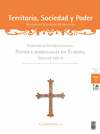Resumen
Resumen: El poder en el mundo carolingio: expectativas y realizaciones, representación y simbología. Tras algunas observaciones preliminares acerca de la tradición de las investigaciones alemanas (sobre los conceptos poder y estado) el artículo presente, basándose en investigaciones recientes, esboza según cuatro planteamientos la situación del reino carolingio conforme a la época, como la potencia más importante de entonces: El «Estado carolingio» se caracteriza en lo exterior tanto por sus vínculos dinásticos como por la tensión producto de las tendencias de unificación política y la fragmentación del reino, de la cual paulatinamente resultarán cuatro reinos parciales. El ejercicio de poder en el interior del reino está determinado por una red (indisociable) de instituciones (oficios e «iglesia real») y lazos personales, por los reyes «itinerantes» así como mediante el «poder consensual» en acuerdo con el rey y sus señores. Esto determina igualmente el orden social, que, al contrario de lo que proponen las investigaciones tradicionales, ni estaba conformado por un «sistema» feudal asentado (como combinación de vasallaje y «beneficio») ni disponía de estructuras feudales uniformes, sino que mostraba una variedad de vínculos personales y feudales como formas de poder señoriales. Las propuestas de investigación actuales (incluyendo las del autor) consideran por una parte los conceptos del imaginario político y las expectativas de los contemporáneos, que ofrecen una imagen clara del orden por la gracia de Dios y del buen rey, quien excedía a los otros en autoridad y virtud, y sobresalía tanto en la defensa exterior y expansión del reino como en la salvaguardia de la paz y la justicia al interior, como en el respeto a las leyes y al orden social. No obstante, el reino es ya en tiempos carolingios un organismo establecido (transpersonal), desligado de la persona del rey. Por otra parte, el foco de interés de las investigaciones está en los aspectos de la representación y la simbología del poder, que determinan tanto las acciones públicas como el cedulario, la percepción de los historiadores medievales o las imágenes que señalan al rey como representante de Dios en el mundo. En la simbología del poder, motivada política o teológicamente, pone de manifiesto el Estado carolingio su expresión más significativa e ilustrativa a la vez.
Palabras clave: Reino franco, Estado, orden social, conceptos y expectativas politica, representación del poder, simbología del poder.
Abstract: Power in the Carolingian world: expectations and realizations, representations and symbolism After some opening remarks on the German tradition of research (the concept of “Herrschaft” sovereignity and “state”), it is the intention of this article to summarize the specific conditions in the Carolingian kingdom as the most important power of the epoch, on the basis of recent research, by pursuing four aspects: The Carolingian state is characterized externally by dynastic bonds as well as by a tension between the political unity and the divisions of the kingdom which resulted in the gradual formation of four independent kingdoms. Internally, the practice of power (“Herrschaftspraxis”) was determined by an (inseparable) network of institutions (offices and “imperial church”) and personal bonds, the itinerate kingship, and political decisions that were reached by a consensus of the king and his influential followers (“konsensuale Herrschaft”). Such bonds equally characterize the social order which, contrary to former opinions, was neither determined by a “feudal system” (vassalage and fiefs) nor by uniform “feudal” structures, but by a variety of personal and seigneurial bonds and forms of power. More recent research (including my own), on the one hand, is directed towards political concepts and the expectations of contemporary people which present a distinct image of the (divine) order and of the ideal king, who surpassed the others by his authority and virtues and stood out due to his defending and expanding the realm outwardly and by safeguarding peace and justice in the interior, but also by respecting the law and the social order. The kingdom, however, had by then already become a fixed (transpersonal) factor which could be detached from the king’s person. On the other hand, modern research is focused on the representation and symbolism of power which determined public actions no less than the form of charters, the perception of historiographers or book illuminations showing the king as God’s deputy on earth. In a symbolism of power, conceived politically as well as theologically, the Carolingian state finds its most significant and at the same time its most illustrative expression.
Key words: Frankish kingdom, social order, political concepts and expectations, representation of power, symbology of power.

